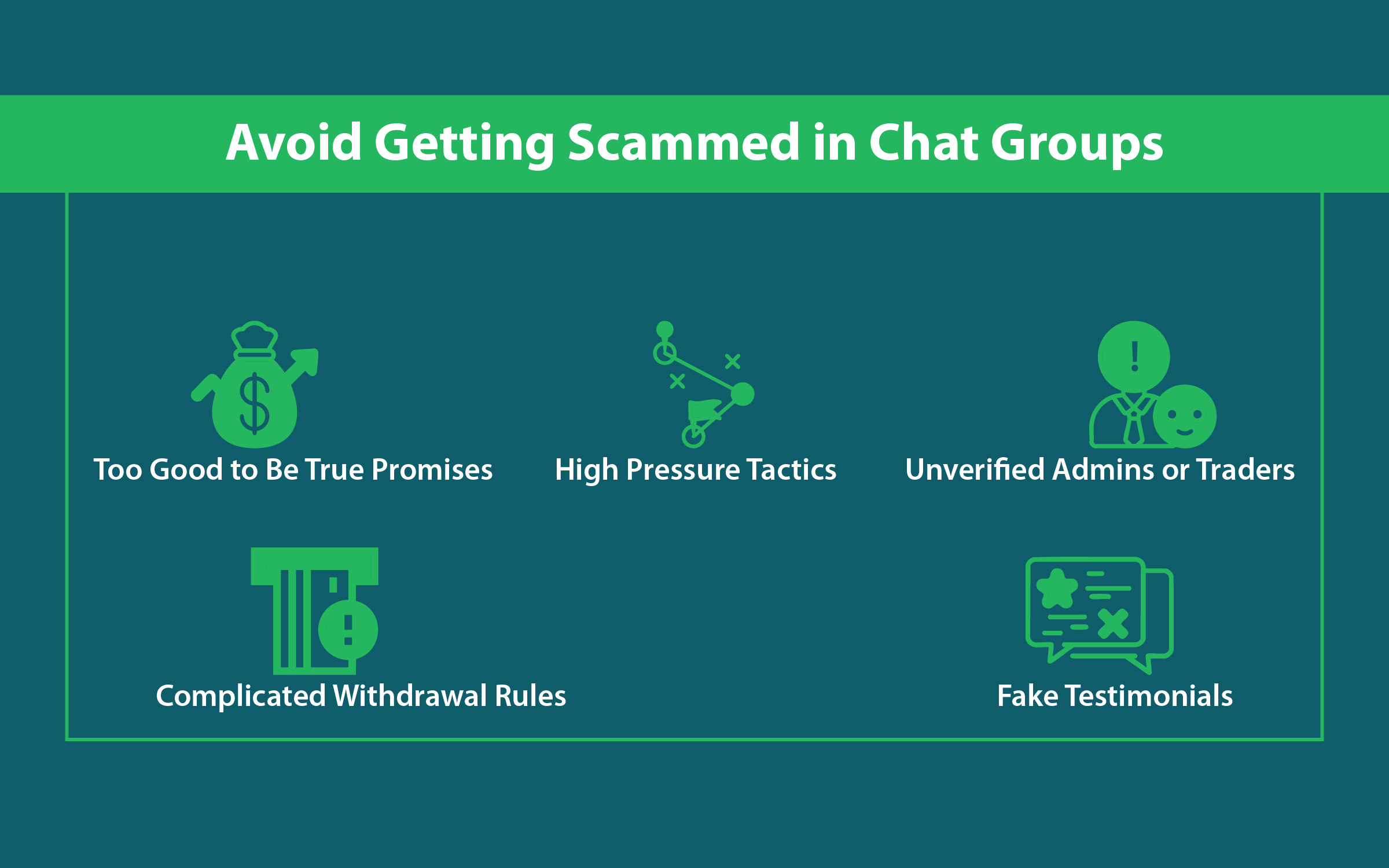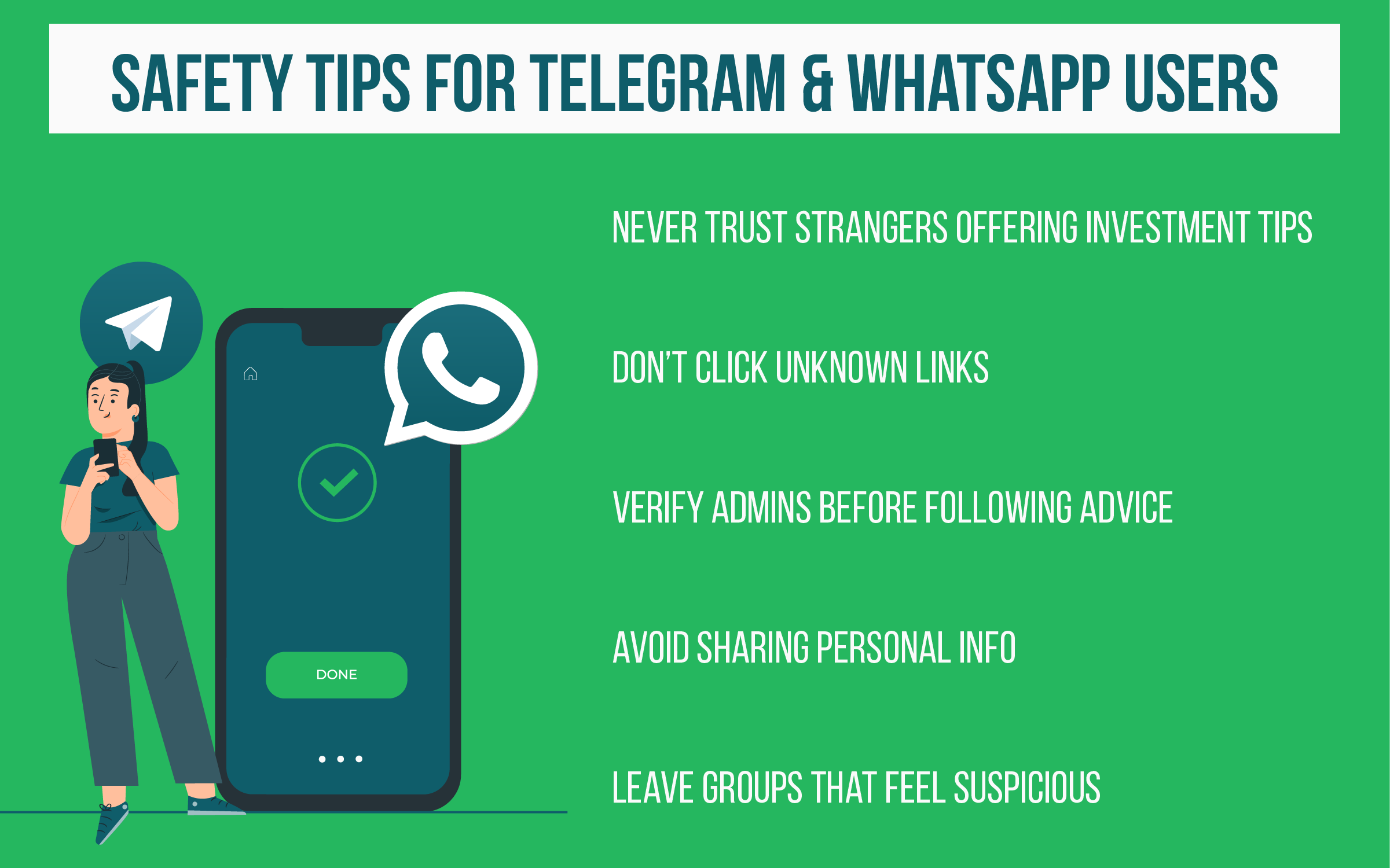
- Crypto
- July 8, 2025
Apps like Telegram and WhatsApp have become part of our everyday lives. We use them to chat with friends, share updates, and join groups with people who share similar interests. However, what many don’t realize is that these same platforms are also becoming centers for scammers, particularly those targeting individuals interested in Forex and cryptocurrency trading.
Scammers are getting smarter. They create fake profiles, share fake profits, and use psychology to trick people into trusting them. And the numbers show just how big this problem is. According to a 2024 report by the Federal Trade Commission (FTC), investment scams stole over $5.7 billion from people in the U.S. alone in 2023, with a large portion linked to cryptocurrency schemes. Telegram and WhatsApp are two of the top platforms used by fraudsters to run these scams, primarily due to their private chat options and ease of creating large group chats.
“Scammers thrive where trust is built quickly and loosely—group chats are a goldmine for them,” says David Gerard, a cryptocurrency journalist and author.
How Forex and Crypto Trading are Rising?
Forex (foreign exchange) and cryptocurrency markets have gained massive popularity over the last few years. Many people are drawn in by the idea of making money quickly, especially when they see others claiming to have turned small investments into huge profits.
Platforms like YouTube, Instagram, and Twitter often feature influencers flaunting their supposed earnings from trading. Messaging apps like Telegram and WhatsApp then become the next step, where people are invited into private or public groups to learn "secrets" of the trade.
These groups appear legitimate. They often have professional-looking names, display fake testimonials, and even share screenshots of successful trades (most of which are edited or fabricated).
Why Telegram and WhatsApp Are Popular Tools for Scammers?
Telegram and WhatsApp might seem like harmless messaging apps, but scammers have found clever ways to use them to their advantage. Here’s why these platforms have become a favorite playground for fraudsters:
1. Encrypted, Fast, and Popular
Telegram and WhatsApp are both encrypted and easy to use. They support group chats and allow file sharing, voice messages, and even bots. This makes them perfect for building communities.
But these features are also what make them attractive to scammers. Once you're in a group, there's very little oversight. Scammers can send messages freely, delete their messages, or even disappear without a trace.
2. No Central Moderation
Unlike social media platforms, where there are community guidelines and content moderators, Telegram and WhatsApp groups are often unmoderated. That means anyone can set up a group and start sending messages without being reported or banned-until it's too late.
4 Common Forex & Crypto Scams in Messaging Groups

Here are the most common forex and crypto scams you’ll find in Telegram and WhatsApp groups:
1. Fake Investment Groups:
Scammers create a group where they post regular updates about trades, often showing exaggerated or fake profits. They encourage users to “invest” with them by sending money to a wallet address or through bank transfers.
Once someone sends money, they're told their investment is growing. But when they try to withdraw it, the excuses begin: "You need to pay a withdrawal fee," "Regulatory clearance needed," or "Account verification pending." Eventually, the scammer vanishes.
2. Pump and Dump Schemes:
This involves artificially inflating the price of a coin or token through hype, then selling it off once the price rises, leaving others with worthless assets.
Scammers create excitement around an unknown or low-value cryptocurrency. Group members are urged to buy quickly before the price "skyrockets." Once enough people buy in, the scammers sell off their shares at the peak, causing the price to crash.
3. Signal Groups:
These groups claim to offer "exclusive signals"—tips on when to buy or sell a currency for profit. Members often have to pay a subscription fee or join a VIP group.
The so-called signals are either random or copied from real traders. There's no accountability, and most users lose money following them. The scammers collect membership fees and then move on to a new group.
4. Giveaway Scams:
In these scams, users are promised free crypto for participating in a giveaway. You’re asked to send a small amount of crypto to “verify your wallet” or “activate your reward.”
There is no giveaway. Once you send your crypto, it's gone. The scammer disappears or blocks you from the group.
Avoid Being Scammed in Chat Groups

Chat groups can seem friendly and trustworthy, but not everyone there has good intentions. Here’s how you can avoid getting scammed while chatting in groups:
1. Too Good to Be True Promises
If someone promises huge profits with little or no risk, it's a major red flag. No real investment can guarantee fixed daily or weekly returns. These claims are designed to trick you into acting fast.
Real trading involves ups and downs. If it sounds too easy or perfect, take a step back. Scammers rely on your excitement to stop you from thinking clearly.
2. High Pressure Tactics
Scammers often push you to invest right away, using phrases like “limited time offer” or “only a few spots left.” They do this so you don’t have time to think, research, or talk to someone else. Genuine opportunities never force you into making snap decisions.
If you’re feeling rushed or anxious, that’s your signal to slow down and walk away. Real investments can wait, but scams usually can’t.
3. Unverified Admins or Traders
If the person running the group refuses to share their real name, background, or any proof of qualifications, that’s a major warning sign. Scammers hide behind fake profiles and avoid being identified.
A real trader or business has nothing to hide; they'll offer details, licenses, or links to verifiable profiles. If you only see a first name or cartoon profile picture, it’s better to be cautious.
4. Fake Testimonials
Be careful with screenshots showing big profits or messages from “happy investors.” Many scammers use fake reviews, copied pictures, or even edited videos to create a false sense of trust. These stories are often too perfect to be real.
Check if the accounts sharing them are new or inactive outside the group. If all reviews sound similar or overly positive, it’s probably a setup to win your trust.
5. Complicated Withdrawal Rules
Many scam groups let you “invest” and even show fake profits. But when you try to withdraw your money, they suddenly ask for extra payments like a “clearance fee” or “tax.” That’s a classic scam tactic.
If you’re being asked to send more money just to get your own back, stop immediately. Legitimate platforms let you withdraw your money without added surprises.
Real-Life Stories of Victims

Behind every scam is a real person who lost money, trust, or peace of mind. Here are some true stories from victims who experienced it firsthand:
Joseph Story: Lost $10,000 in a Telegram Group
Joseph joined a crypto investment group on Telegram after a friend forwarded an invite. The group seemed to have real daily updates, charts, and even live videos. He was convinced to invest $10,000 with a promise of a 30% return in 10 days.
Ten days later, Joseph was told he needed to deposit another $200 for "processing fees." When he refused, the admin removed him from the group. His money was gone.
Susan’s WhatsApp Trap
Susan was approached by someone on WhatsApp who claimed to be a crypto trader with a “special method.” They even shared charts and documents to look credible. She invested $5,000 over a week.
The person stopped replying after the money was sent. Susan later found out that multiple people were scammed the same way, and the contact had changed their number.
Dont Get Fooled: How Scammers Make Themselves Look Legit
Scammers know how to look trustworthy even when they’re not. Here’s how they create the illusion of being legit to win your trust:
- Professional Language & Graphics: Scammers often use well-designed logos, trading dashboards, and even business-like presentation documents to appear genuine.
- Fake Websites & Apps: Some scams even go as far as building fake investment platforms where users can log in and see their supposed growing balance, only to later find out it’s all a lie.
- Buying Followers & Engagement: In public groups, scammers sometimes buy fake members to make the group look popular. They also use fake bots to post positive comments and reviews.
- Fake success stories and testimonials: They post screenshots of profits, payment receipts, and happy “client” reviews, all of which are usually edited or completely made up.
- Copying content from real traders: Some scammers steal posts, analysis, and charts from genuine experts and share them as their own to gain credibility.
- Actively posting updates and charts: Daily updates with trading charts, “market insights,” and positive news keep the group looking active and legit, even if the content is fake or copied.
- Creating fake websites or apps: Some go as far as building fake investment platforms where users can “see” their money growing- none of it is real, just a trick to build trust.
- Responding like customer support: They often act polite and helpful in the beginning, just like real service agents, to make you feel comfortable and confident in them.
5 Safety Tips for Telegram & WhatsApp Users

These apps feel private and safe, but scammers use them too. Here’s what you should keep in mind to stay protected while using Telegram and WhatsApp:
1. Research Before You Join:
Before you join any investment group on Telegram or WhatsApp, take a few minutes to look it up online. Type the group name or the admin’s name into Google. Check forums, Reddit, or review sites for any red flags or scam reports. If there’s nothing to be found, or worse, if people are warning others about it, that’s your cue to stay away. It’s always better to spend five minutes researching than to spend months trying to recover lost money.
2. Never Share Personal or Financial Details:
It’s important to remember that Telegram and WhatsApp are not secure places for sharing sensitive information. Never give out your bank account number, credit card details, government ID, or your crypto wallet’s private keys. Scammers are just waiting for that one moment of trust to take everything from you. Keep your private information exactly that private. If anyone asks for it, no matter how friendly they seem, that’s a big red flag.
3. Use Trusted Platforms Only:
Sometimes scammers will direct you to a flashy-looking website or an app that looks very real. They’ll say it’s their “trading platform” or a place where you can “track your profits.” Don’t fall for it. These platforms are often fake; they're made to fool you into sending your money. Stick with trusted, well-known investment apps and platforms that have a solid reputation and clear reviews. If you’ve never heard of it, don’t use it.
4. Be Skeptical of “Too Good” Offers:
If someone’s promising to double your money overnight or give you guaranteed profits, take a step back. In the real world, investing always involves risk, and no one can promise you easy wealth. Scammers use big returns to get your attention, but behind the scenes, it’s just a trap. Always ask yourself, if it’s so easy, why are they offering it to strangers on a chat app? Trust logic over hype.
5. Report Suspicious Groups:
Don’t just leave a suspicious group; report it. Both Telegram and WhatsApp have options to report spam, fraud, or suspicious behavior. By reporting these groups, you help protect others from falling into the same trap. It only takes a few clicks, but it can make a big difference. And if you know someone else who’s in that group, give them a heads-up. Sharing a warning can save someone from a major loss.
What to Do If Youve Been Scammed?
If you’ve sent money, contact your bank or crypto exchange immediately. They might be able to block or trace the transaction if you act fast. Start by stopping all communication with the scammer. Block them immediately and leave any group they’re managing. The longer you stay connected, the more chances they have to keep manipulating you.
Take screenshots of all conversations, wallet addresses, and transaction receipts. This can be useful for police or cybercrime reports. Some transactions can be reversed if reported quickly enough.
File a Complaint
Report the incident to the Federal Trade Commission (FTC) through ReportFraud.ftc.gov. The FTC collects fraud complaints and shares them with investigators. You should also file a complaint with the FBI’s Internet Crime Complaint Center (IC3). Recovery services like Financial Recovery Expert also offer guidance through the process and assist in recovering your lost money. These steps play a key role in helping authorities track and stop these scammers.
Both Telegram and WhatsApp allow users to report scams directly:
- On Telegram: Open the scammer’s profile > tap the three dots > select “Report”
- On WhatsApp: Tap the chat > “More” > “Report” and block the contact
Also, leave a note in the group (if it’s still active) to warn others before you exit.
Think Before You Trust
Messaging apps have changed the way we connect, but they’ve also opened the door to a new generation of scams. Telegram and WhatsApp can feel like safe, private spaces, but they are often used by fraudsters hiding behind fake names and empty promises. A separate report revealed that more than 1 in 4 people who lost money to online scams said it started on a messaging app, with Telegram being one of the top platforms mentioned. Don’t be afraid to ask questions, do your research, and speak out if something feels off. Your awareness is your best defense.
Stay informed, stay skeptical, and remember: If it sounds too good to be true, it probably is.
FAQs (Frequently Asked Questions)
Most scams begin with a random message or a group invite offering free trading tips or investment opportunities. Once you join, you’ll see fake success stories, charts, and claims of high returns. These are designed to make you trust the scammers and invest money.
Some warning signs include promises of guaranteed profits, urgent calls to invest quickly, requests for personal or financial details, fake testimonials, and unknown apps or platforms. If anything feels rushed or “too perfect,” it’s best to stay away.
It’s difficult but not impossible. If you act fast, contact your bank or crypto exchange immediately. In the U.S., also file reports with the FTC and the FBI’s IC3 website. While recovery isn't guaranteed, quick action can increase your chances.
No, not all groups are fake. Some are real and helpful. But scammers often pretend to be experts and create fake groups to trap people. Always research a group before joining, and never send money to someone you don’t know personally.
Leave the group immediately and report it within the app. Save any evidence in case you need it later. Share your experience with others to spread awareness, and report the scam to official authorities like the FTC or IC3 if money was involved.